
Topics
Guests
- Ahdaf Soueifthe aunt of Alaa Abd El-Fattah.
- Sharif Abdel Kouddousaward-winning journalist and the Middle East and North Africa editor for Drop Site News.
Egypt’s best-known political prisoner, Alaa Abd El-Fattah, was granted a presidential pardon on Monday and has reunited with his family after spending most of the last 12 years in prison. The writer and political dissident was a leading voice in the 2011 Arab Spring protests that toppled the Mubarak dictatorship, and he has been repeatedly targeted by the current authoritarian government of President Abdel Fattah el-Sisi. Most recently, he was sentenced to five years in prison for a Facebook post. That sentence ended last September, but authorities refused to release him, saying his two years of pretrial detention did not count. Monday’s pardon comes after years of international pressure to “Free Alaa,” including in the United Kingdom, where he also holds citizenship. Both Alaa and his mother, Laila Soueif, participated in lengthy hunger strikes.
Ahdaf Soueif, Abd El-Fattah’s aunt, says his release has brought the family “tremendous relief,” as well as “hope that this is the beginning of the release of a lot of other political prisoners” in Egypt.
We also speak with journalist Sharif Abdel Kouddous, who has covered the case for many years. “Alaa is free, but he doesn’t have justice,” he says. “There’s still so many thousands of political prisoners in Egypt, including dozens who are behind bars simply for speaking out in solidarity with Palestine and against Israel’s genocide in Gaza.”
Transcript
AMY GOODMAN: Egypt’s most prominent political prisoner, Alaa Abd El-Fattah, has been released and reunited with his family after being granted a presidential pardon on Monday along with several other prisoners. Alaa is 43 years old. He spent most of the last 12 years of his life in prison. The writer, blogger and political dissident was a leading voice in the 2011 Arab Spring protests that toppled the Mubarak dictatorship, and has been repeatedly targeted by the current authoritarian government of President Abdel Fattah el-Sisi. Most recently, he was sentenced to five years in prison for a Facebook post. That sentence ended last September, but authorities refused to release him until now, saying his two years of pretrial detention didn’t count.
Monday’s pardon comes after years of international pressure led by his family to free Alaa, including in the United Kingdom, where he also holds citizenship. Both Alaa and his mother, Laila Soueif, went on extended hunger strike to draw attention to his case. This is one of Alaa’s sisters, Sanaa Seif, speaking at the family home after Alaa’s release.
SANAA SEIF: [translated] I cannot believe myself, for sure. I cannot yet comprehend that this is real and that Alaa is with us. I cannot believe that I’m seeing him here at home among us normally. I guess it will feel more real when we go to sleep, wake up and find him present, and when his son arrives here from traveling. I’m really happy.
AMY GOODMAN: Sanaa is one of Alaa’s two sisters. And this is Alaa’s mother, professor Laila Soueif.
LAILA SOUEIF: [translated] Despite our great joy, the biggest joy is when there are no political prisoners. The big and real joy is when there are no political prisoners.
AMY GOODMAN: We go now to London, where we’re joined with Laila Soueif’s sister, the renowned writer Ahdaf Soueif. She is Alaa Abd El-Fattah’s aunt, the author of several books, including The Map of Love, which was shortlisted for the Booker Prize, and Cairo: My City, Our Revolution. And here in New York, we’re joined by Sharif Abdel Kouddous, award-winning journalist, Middle East, North Africa editor at Drop Site News.
We welcome you both to Democracy Now! Ahdaf, if you can share your feelings today, just 24 hours after it was announced that your nephew was pardoned?
AHDAF SOUEIF: Amy, hi. Hello to you and to all your viewers.
I really don’t even know how to — I mean, how to describe my feelings. It’s a tremendous relief. We keep saying, “Is this over? Is this — can we stop now?” I haven’t seen Alaa. I’ve spoken to him on the phone. So, tremendous, tremendous relief, and also a lot of very active hope that this is the beginning of the release of a lot of other political prisoners, as well.
AMY GOODMAN: We’re showing images of your sister, the Cairo University math professor Laila Soueif, hugging her son. She and Alaa himself almost died in their hunger strike. She did it in Britain, thinking that was the pressure point that would bring him home, the British prime minister putting pressure on Sisi, and, of course, Alaa in prison. What about their health?
AHDAF SOUEIF: Well, they’re looking, I think, pretty haggard, pretty gaunt. This is masked, to an extent, maybe masked, maybe even highlighted, really, by how clearly happy and joyful they are. But I think that getting back to health, getting back to a good weight, is really paramount for them both. Now, they’ve been under a lot, a lot of stress. And hunger strikes are — you know, hunger strikes are very, very difficult, and Laila’s lasted for so very long.
JUAN GONZÁLEZ: And, Ahdaf, I wanted to ask you, for those of our audience who are not familiar with your nephew’s case, could take us back to the — he was imprisoned twice under Sisi. Could you talk about the reasons the government gave and the fight to free him?
AHDAF SOUEIF: Well, he was — he went to trial twice, and both times he received five-year sentences. The first time, which was in 2014, was actually the culmination of — before President Sisi, it was also President Mohamed Morsi, and, before that, President Mubarak. Alaa has been in prison under every system that has ruled in Egypt. But these two long stretches, 2014 and 2019, the first one was for taking part in a silent protest outside — outside the Senate or Parliament to urge them not to allow military trials for civilians. He was there for 10 minutes, and he was arrested two days later and charged with unlawful protest and even with organizing it, and sentenced to five years. And I think there were 13 other people, or maybe even 23, in that case with him, and they all received jail sentences. He served that sentence from 2014 until March 2019. And when he came out, he was under surveillance order, which meant he had to report every evening at 6 p.m. to his local police station and spend the night there and go home at 6:00 in the morning. And he did that for six months.
And then, in September 2019, he was arrested again, charged with a menu of charges, and then, eventually, two years later, tried on a charge of spreading false information. What he had done was he had reposted a post about a prisoner dying in custody. And the post was truthful. The prisoner had died in custody. Alaa reposted it and was charged and was tried and was sentenced to five years. The five years ended September last year, and he was not released. And at that point, Laila, his mother, decided that things couldn’t wait any longer, really, that more than 11 years of her son’s life had been taken from him, and she started her hunger strike. And now a year later, we’re here celebrating his release with tremendous relief.
JUAN GONZÁLEZ: Well, it certainly is a relief for your family. But as Laila mentioned in her statement, there are thousands, some people say even 20,000 to 60,000, political prisoners still in Egypt. What about the — could you talk about the failure of the rest of the world to put the pressure on the Egyptian government to release these people?
AHDAF SOUEIF: Well, the various human rights organizations, the international human rights organizations, are actually doing a lot of work on political prisoners in Egypt. And, of course, our hope is that, you know, the release of somebody as high-profile as Alaa would persuade the Egyptian government to open the doors to other prisoners, as well, and particularly, really, at this moment when Egypt is having such a — such an external issue with what is happening in Gaza, in Palestine, and when the Egyptian government is actually aligned with the wishes of the Egyptian people to not allow the forced displacement of the Palestinians. And so, this is probably a very good moment for that alignment to actually be translated into releases for a lot of political prisoners.
AMY GOODMAN: Ahdaf Soueif, you were the first family member — right? — he talked to. Can you explain the confusion yesterday when your sister, professor Laila Soueif, and Sanaa, his sister, trucked out to the prison, thinking they would greet him there, but he wasn’t there?
AHDAF SOUEIF: Well, yeah, this is a kind of, like, dramatic comic ending — we hope ending — to this story. Yesterday morning, the presidential pardon that we had all been waiting for was signed, and the press covered it, so we learned that that had happened, and Alaa’s lawyer posted this. And so, Laila and Sanaa got into a car with a couple of other friends and drove to the prison to be there to welcome him when he was released. They knew, of course, that there was a process that had to happen before he was released, but they couldn’t just stay home, so they drove off to the prison, which is about an hour and a half away from Cairo along the desert road towards the north coast. And so, all day they were waiting outside the prison. There were friends waiting at a nearby gas station. We were waiting here. Everybody was just spending the day waiting. And we knew that the process through which the release would actually happen was taking place, but we had no idea how long it would take. And word was that it wouldn’t happen that night; it would probably be tomorrow, i.e. today. But Laila was not giving up and was insistent that she would wait outside the prison in case they released him.
Well, what actually happened was that at about — at about 11 p.m., I got a phone call from a number that I didn’t recognize. I didn’t answer it. And then I got a message from that same number saying, “Answer me. This is Alaa.” And I couldn’t believe it. So I called him, and he said — he said, “It’s Alaa. It’s Alaa. Ahdaf, I — where are you?” I said, “Where are you?” He said, “Yeah, I’m out. I’m out. I haven’t moved, but where are you?” He said, “I’m outside the house, and I can’t get in. Where’s my mom?” I said, “Well, your mom is at the prison gates waiting for you.” So, anyway, so then we called my brother, who went round and opened, unlocked the door for him. And friends started coming around. And we called Laila and Sanaa, and they turned around and drove back to meet him.
So, basically, yeah, the process had happened, and he’d been driven out, and they hadn’t noticed. And he’d been driven from the prison the hour and a half to his local police station, went into the police station. The police station drove him to his house and said, “Are you fine here?” And he said, “Yes.” And they left him there, and he rang the doorbell, and nobody opened, because his mom was at the prison gates.
AMY GOODMAN: I mean, this is just remarkable, after all these years, more than a decade. Sharif, you know Alaa well. You’ve interviewed him. He was a leader of Tahrir Square, of the Arab Spring in Egypt. His mom going to Britain to put pressure there, seeing that within Egypt, she didn’t seem to succeed in securing his release, so if the British government. Talk about that, what ultimately happened. Both Laila Soueif and Alaa are British Egyptian citizens.
SHARIF ABDEL KOUDDOUS: Yeah. Let me just first say that Alaa’s release from prison is a moment of light in this time of darkness, and his freedom is a testament to the power of hope, of resilience, of struggle and, ultimately, of solidarity and love, the love of his family, who fought and sacrificed so much, and the love of one’s chosen family, Alaa’s friends and comrades who around the world campaigned tirelessly and fought for years and never gave up.
And when I speak about his family, I’m talking about Ahdaf; talking about his cousin, Omar Robert Hamilton, who helped spearhead the campaign for him; his sisters, Mona and Sanaa — you know, Sanaa spent over three years in prison, much of it being put behind bars for advocacy around her brother — but perhaps most of all for his mother, Laila Soueif, who sacrificed herself. She sacrificed her body, the body that gave birth to Alaa, and went on hunger strike last year that lasted over nine months, that really brought her to the doorstep of death. And her willingness to put her life on the line for her son’s freedom, for her son’s life, is what really pressured the British government to really act and negotiate on a real level.
So, what happened was — Ahdaf mentioned the different imprisonments, and when Alaa was sentenced in December of 2021 to five years, a couple months later, he began a hunger strike. And the family announced that they had obtained British citizenship for Alaa to get them out of what they called their impossible ordeal, because it didn’t seem like the Egyptian government was ever going to let him go. And they decided that they needed the British government to then pressure the Egyptian government to let him out.
Alaa was on hunger strike for over 200 days when Egypt hosted the climate conference in Sharm el-Sheikh, U.N. COP conference that you covered, Amy. And timed to coincide with the first day of the conference, he announced that he was going to go on a water strike. And this brought to the forefront at the climate conference Egypt’s — Alaa’s case himself, but Egypt’s dismal rights record, and I think, for the first time at a U.N. climate conference, inextricably tied climate justice to human rights in a very profound way. After five days, he collapsed in what he described as a near-death experience, and he was revived. During that time, we saw massive protests inside the conference. We saw the White House, the French president, the German chancellor, then-British Prime Minister Rishi Sunak all publicly call for Alaa’s release.
He wasn’t released, but what he did accomplish with his own hunger strike was his transfer outside of the Maximum Security II wing of Tora Prison, which is known as Scorpion Prison. He had been held there for three years, over three years, with no books or reading material, no sunlight or fresh air, no exercise or time outside of his cell, no bedding, no pen and paper, no clock. And Alaa is very tough. He has a very strong intellect and will, but this was beginning to break him. And at some point a few months earlier, he had expressed suicidal thoughts. So, they transferred him to this newly built prison in Wadi Natrun.
But then he was supposed to be released last year in September, at the end of September, and the Egyptian government, in violation of Egypt’s own penal code, did not count the two years of pretrial detention that he had spent in his sentence, and said that he was going to continue until January 2027. And at this point, Laila Soueif decided that that was not going to happen, and so she embarked on this hunger strike, and she conducted most of it in London. She would spend most mornings outside the headquarters of the Foreign Office in London in this protest. By February of this year, she had lost a third of her body weight, and she collapsed, or her blood sugar levels collapsed, and she was hospitalized.
And this prompted, just a few days later, the British Prime Minister Keir Starmer to have a call with Egyptian President Abdel Fattah el-Sisi. And then we saw a flurry of diplomatic movement with Britain’s national security adviser Jonathan Powell, who helped broker the Good Friday Agreement in Northern Ireland, begin these talks. And this eventually culminated — in July, Alaa was removed from the terrorism list, and eventually, you know, he was pardoned.
So, I think — I think we also just — one final thing, we have to say that Alaa is free, but he doesn’t have justice. He spent more than half his adult life behind bars. His father died while he was in prison, and while Sanaa was in prison, as well.
AMY GOODMAN: His father died while he, himself, the father, was in prison, or while Alaa was in prison?
Father died while I was in prison. In prison in 2014 who’s now 13, has grown up without him,
SHARIF ABDEL KOUDDOUS: No, no, the father died while Alaa was in prison and Sanaa was in prison, in 2014. Alaa’s son Khaled, who’s now 13, has grown up without him.
And beyond Alaa, there are still so many thousands of political prisoners in Egypt, including dozens who are behind bars simply for speaking out in solidarity with Palestine and against Israel’s genocide in Gaza. And Palestine is central to Alaa’s politics and his thinking, and he was able to visit Gaza many years ago. He has a beautiful essay in the anthology of his writings, called “Palestine on My Mind,” that I encourage everyone to read.
But, yes, Alaa is free, and the photos and footage of him in Cairo with his family are joyous beyond comprehension. He spent last night in his bed for the first time in 11 years. And the world has been made that much richer with him finally back among us.
AMY GOODMAN: Well, we thought we’d end this segment, clearly an “Alaa Day” for so many around the world with Alaa’s freedom, with Alaa in his own words, going way back. We first interviewed Alaa Abd El-Fattah on Democracy Now! in February of 2011 during our special coverage of the Tahrir Uprising, of the Arab Spring.
AMY GOODMAN: And I’ve just been told that we do have someone on the phone right now, so we’re going to go right to that person. Can you tell us who you are and where you are?
ALAA ABD EL-FATTAH: This is Alaa Abd El-Fattah. I’m an activist in this revolution. I’m standing in front of the TV building in Cairo.
AMY GOODMAN: OK. Tell us, Alaa — it’s great to have you with this, a prominent Egyptian blogger, democracy activist — what is happening in front of the presidential palace, one of a number of new places that are being occupied by protesters, like Egyptian state TV, as well, and the Parliament.
ALAA ABD EL-FATTAH: In front of the TV building, it’s a big crowd. We can’t shut down the TV building, because of its shape, and it’s heavily barricaded by the army. And what we’re trying to do is put pressure on the employees working inside to join us, to revolt and refuse to spread state propaganda.
AMY GOODMAN: So, that was Alaa Abd El-Fattah in February of 2011. In December of that year, I interviewed him again after he spent nearly two months in prison, which prevented him from attending the birth of his son, Khaled. I asked Alaa to describe his conditions in prison at the time.
ALAA ABD EL-FATTAH: The first five days, I was put in a pretty bad prison. Now, all prisons — well, all prisons in the world are bad, like, you know, losing your freedom is quite tough, but also all prisons in Egypt are in very poor conditions. And so, even if they don’t torture you, just spending one night there is already, you know, a bit too much. But I was in a particularly bad prison, and they made sure to put me in a particularly bad cell and to deny me, you know, any comfort. So, for instance, I was in a complete darkness for five days.
AMY GOODMAN: So, that’s Egypt’s most prominent political prisoner, Alaa Abd El-Fattah, in 2011. He has just been released from prison after well over a decade, 13 years, and reunited with his family. I want to thank our guests, Sharif Abdel Kouddous, award-winning journalist, Middle East, North Africa editor at Drop Site News, and Ahdaf Soueif, Alaa’s aunt and renowned author, speaking to us from London, the first family member he got to speak to yesterday after he was freed.
Next up, California Governor Gavin Newsom signs the No Secret Police Act, banning all law enforcement, including ICE agents, from covering their faces while conducting raids. Stay with us.
[break]
AMY GOODMAN: “Everybody Deserves to Be Free” by the Resistance Revival Chorus, performed at Town Hall on Sunday night for the Voices for Gaza program.


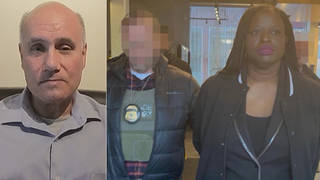
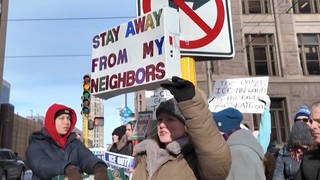
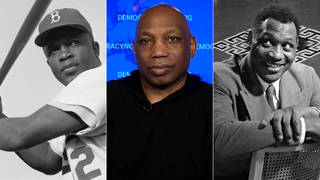





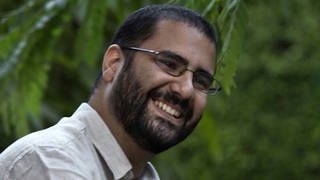
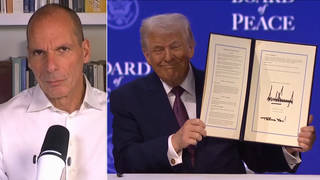
Media Options